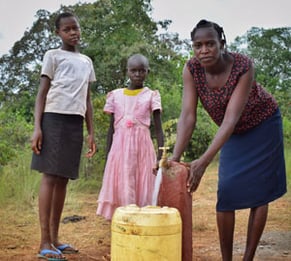 |
| Catherine (right) collects clean water |
We felt like we were on an island of large flat sheets of rock, separated from the rest of the villages by huge gullies and cliffs. Our driver meandered gently over the bouncy road to Koiserat village in the Bartabwa area program. There are two levels to this region: the high and the lowlands. Koiserat is the end of the highland. It’s a flat rocky expanse, just before the drop to the expansive Kerio Valley. One does not need to be told that water is a challenge here because it is clear from a quick look at the area. We are welcomed by Catherine Toroitich. She starts narrating the challenges she endured for many years.
Catherine is a tall, jolly and friendly woman in her mid-thirties, and a mother of seven children, ages 8 to 17. “I used to collect water in the gullies nearby which would dry up and we would be forced to walk as far as Bartabwa dam (about 4.3 miles away), driving our cows and carrying clothes to wash with brown water,” she explains. The alternative was Kibuti streams which they went to at night to avoid long queues and extreme sun heat.
“At one time, a school teacher accidentally dropped her jerry can back into the river as she struggled to climb up. She left it there and also left the school to look for teaching opportunities elsewhere.” Catherine remembers.
For Catherine and many other women, leaving like the teacher wasn’t an option. They were stuck in this hardship. It also meant the school kept losing teachers, affecting the children’s education.
It was not until the coming of the Koiserat water project, a partnership of World Vision and the government* targeting 3600 people, that relief came into to Catherine’s life. With no more long treks to find water, Catherine turned her time and energies to productive agricultural efforts to meet her family’s needs. She attended World Vision’s Empowered World View training and became a trailblazer in her village. She is among the very first Community Health Volunteers trained by World Vision.
Catherine only needed the encouragement for her to bring change in her life. The Empowered World View training helps with mindset change and is intended to confront one’s limiting perception of what they have and can do based on a biblical viewpoint. After the training, Catherine was quick to apply it, starting with her bus ticket reimbursement from World Vision to buy coffee seedlings, which she planted. She also planted bananas and cassava neatly lined on her small fertile farm.
Today, as she welcomed us, we could not help but admire her 300 coffee trees and the lush banana plantation (200 plus trees) which we tasted. From her banana sales, she has saved money to pay school fees for her 11-year-old daughter. Catherine confesses she would never have done this without the burden of water being moved out of the way. Now she is free to blossom since clean water is now available. “We could not do banana farming, coffee and even village savings groups without this water. We thank God and we thank our donors.”
*The government drilled the well and built a storage tank, and World Vision equipped with solar powered pump, built one 50,000-liter tank and distribution pipeline of over 12kms with various collection points along the line).







